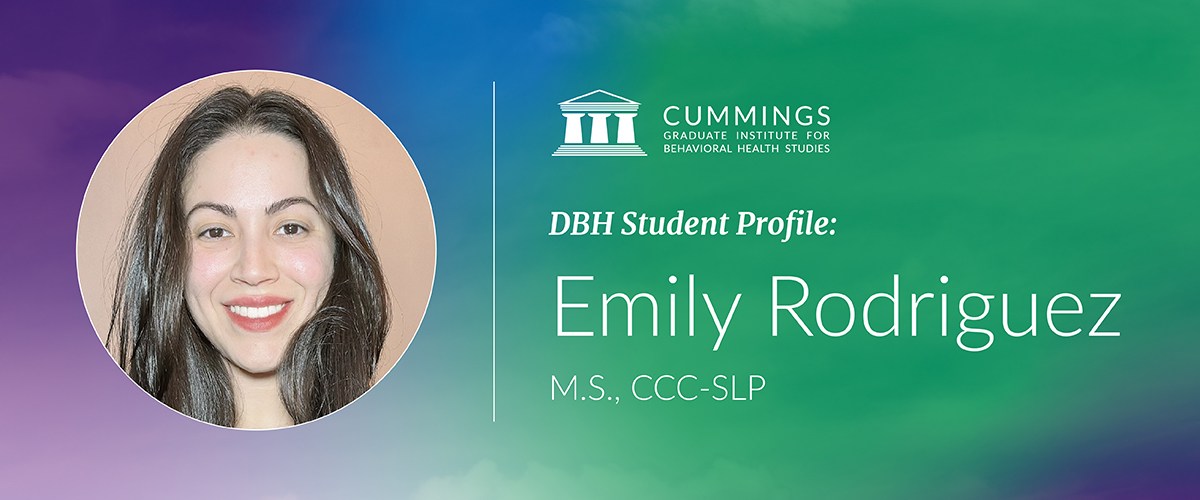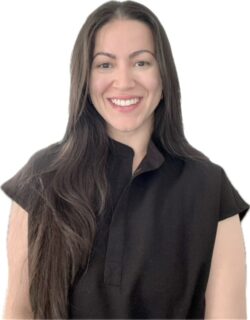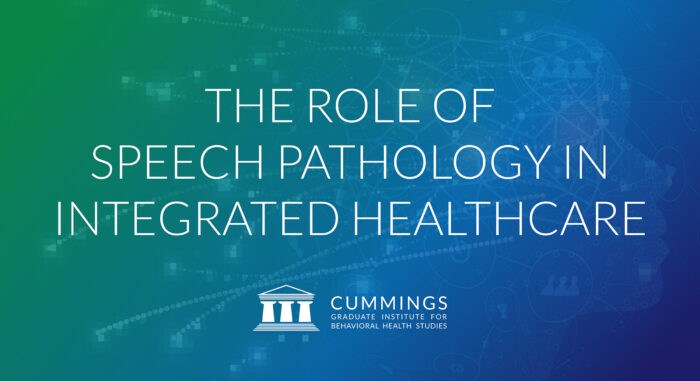 The Power of a Personalized Approach: Emily Rodriguez’s Vision for the Integration of Pediatric Speech Therapy and Behavioral Health
The Power of a Personalized Approach: Emily Rodriguez’s Vision for the Integration of Pediatric Speech Therapy and Behavioral Health
April 10, 2024
Meet Emily Rodriguez, a Doctor of Behavioral Health (DBH) candidate at Cummings Graduate Institute for Behavioral Health Studies and a dedicated pediatric speech-language pathologist (SLP). Specializing in children aged 2 to 5, Emily serves as a beacon of support for families navigating the complexities of childhood diagnoses. With the majority of her clients being 2-year-old toddlers, Emily is often the first point of contact for parents grappling with a recent diagnosis for their child. Her expertise in providing comprehensive assessments and tailored recommendations, ensures each child receives the individualized care they need. Not content with merely addressing communication challenges, Emily is on a mission to broaden her scope and expertise as a Doctor of Behavioral Health. Her aspiration to pursue the DBH degree stems from a deep-seated desire to effectively guide parents through the emotional journey accompanying a diagnosis and subsequent steps forward. Having served the Miami, FL area for many years, Emily has had the honor of working with countless families and children in need. Looking to the future, Emily plans to expand her services to the Florida Keys, an area where access to therapy services is limited, after completion of her DBH degree. The COVID-19 pandemic has led to an influx of families relocating to Florida, and as a native of the Florida Keys, Emily finds immense joy in witnessing her community thrive and grow. Her ultimate goal is to create a safe, supportive, and comfortable environment where children and parents alike can access essential services, including speech therapy, occupational therapy, and mental health counseling. In this interview, Emily reflects on her professional and educational journey in the DBH program and shares opportunities for innovation in pediatric speech and language therapy in the behavioral health sector.
How are you actively contributing to your local community through your behavioral health expertise?
I provide private speech and language therapy sessions to children who attend private schools in Doral, Florida. Most of my clients are toddlers between 2 and 5 years old, with a significant proportion being 2-year-olds. As the first clinician on their team, I thoroughly assess each child’s speech and language development, including their receptive and expressive language skills, articulation, and phonology. Based on the evaluation results, I then developed a customized treatment plan tailored to each child’s specific needs. In addition to speech and language therapy, I recommend additional evaluations, such as occupational, behavioral, or neurological assessments, if necessary. I understand that early intervention is critical, and I work closely with parents to ensure they know their child’s diagnosis and therapeutic journey. It is highly gratifying to support parents throughout this process and help them navigate the complexities of their child’s diagnosis. I plan to utilize my knowledge gained through the Doctor of Behavioral Health degree program to provide more comprehensive assistance. I leverage this expertise to provide holistic care to my clients, considering the broader context of their lives to ensure that their speech and language therapy is integrated into their overall health and well-being.
What aspects of your professional experience the have influenced your approach to behavioral health?
As a professional who frequently works with new parents and young children, I often receive requests for guidance and assistance from parents who are looking for help after their child has been diagnosed with a condition. Based on my experience, I’ve learned that the best approach to supporting these families is to take a personalized approach that takes into account each family’s unique needs. This includes considering the child’s interests, as well as the parents’ concerns regarding training and support. However, I also understand that each case is different, and every child requires an individualized approach to ensure that they receive the best possible care. For example, some children may have difficulty following up on recommended treatments, such as occupational therapy and behavioral therapy, for extended periods. In such cases, it’s vital to maintain a persevering attitude and advocate for the child while providing recommendations and offering parents the necessary training and support to help them navigate their challenges. I believe that every child deserves to receive the support they need to grow and thrive, and I’m committed to providing parents with the resources they need to make that happen. Whether it’s connecting them with specialized services, offering practical advice, or simply lending a listening ear, I’m here to help parents navigate the complex world of raising a child with a condition.
 Reflecting on your experiences, how have you managed challenges in behavioral health, and what strategies do you envision employing to conquer similar challenges moving forward?
Reflecting on your experiences, how have you managed challenges in behavioral health, and what strategies do you envision employing to conquer similar challenges moving forward?
In my current role at a private school, I have come across a significant challenge concerning the inadequate training of teachers in recognizing developmental delays in children’s expressive language skills, receptive language skills, and social-pragmatic skills. While teachers are often required to report on a child’s progress, it is crucial to identify and alert parents of any delays in these areas early on, particularly in pre-kindergarten or daycare settings. Since parents may not have another child of typical development to compare with, such as a sibling, they may not be aware of such delays. This lack of awareness can lead to a delay in seeking professional help, which can negatively impact a child’s development in the long run. To address this issue, I have decided to offer training sessions to schools on identifying red flag behaviors and how to approach parents in a sensitive and effective manner. During these training sessions, I will share my expertise and experience in recognizing developmental delays in young children, along with evidence-based strategies to help address these delays. Additionally, I will provide resources and support to teachers so that they can continue to identify and address developmental delays in their students, ensuring that every child gets the support they need to reach their full potential.
Can you share a specific instance that has profoundly shaped your understanding of integrated care and its intersection with behavioral health?
As a private contractor in the healthcare field, I was initially hesitant to suggest to my employer the idea of creating a chat group that would include each patient’s therapeutic team and parent. The reason behind my apprehension was the daunting task of regularly contacting each child’s parent and team member, including the behavior team or occupational therapist, in order to provide them with updates on the child’s progress. However, after much brainstorming, I came up with the idea of utilizing a WhatsApp chat group as a platform for sharing recommendations, best practices, and progress updates. I believed it would be an effective way to keep everyone in the loop and ensure that all parties were on the same page with regards to the child’s treatment plan. To my delight, my idea was met with great enthusiasm by my employer, and the chat group was created. Since then, it has proven to be a successful approach for all involved, with regular updates being shared among the group members, and everyone playing an active role in the child’s treatment journey. The chat group has facilitated better communication, collaboration, and coordination among the child’s therapeutic team and their parents, resulting in improved outcomes for the child.
How do you see yourself making a lasting impact in the behavioral health field?
After completing my Doctorate in Behavioral Health, my plan is to relocate to the Florida Keys to expand my practice and offer a wider range of services. The Florida Keys have seen a significant increase in population since the COVID-19 outbreak, which has created a need for additional resources and services in various areas. Having grown up in the Florida Keys, I have firsthand knowledge of the limited resources available, and my goal is to contribute to the community by providing comprehensive speech-language, occupational, and mental health services. I believe that my experience and qualifications will allow me to make a significant impact on the community. By providing these services, I hope to improve the quality of life for those in need and help them reach their full potential. I am committed to delivering the highest standard of care and ensuring that every patient receives the personalized attention and support they require. Ultimately, my aim is to make a positive difference in the lives of the people of the Florida Keys, and I look forward to the opportunity to do so.
Emily’s multifaceted role as a Doctor of Behavioral Health student and pediatric speech-language pathologist underscores her dedication to advancing care and opportunities for her clients and their families. Emily not only navigates the complexities of diagnosis and treatment, her experience illuminates the intricate interplay between expertise and a personalized approach in the realm of early childhood developmental speech and language disorders. As she envisions a future marked by expanded services and enhanced accessibility for the Florida Keys community, Emily champions the transformative potential of integrating speech therapy, occupational therapy, and behavioral health services under one roof. Her trajectory exemplifies a commitment to elevating standards of care with an integrated behavioral health lens. With Emily’s vision, the future of pediatric therapy in the Florida Keys shines brighter than ever before.
Connect with Emily Rodriguez
LinkedIn: Emily Rodriguez
Check Out Emily Rodriguez on the Disruptors at Work Podcast
 Disruptors at Work: an Integrated Care Podcast, Season 3, Episode 4: The Role of Speech Pathology in Integrated Healthcare with Emily Rodriguez, M.S., CCC-SLP
Disruptors at Work: an Integrated Care Podcast, Season 3, Episode 4: The Role of Speech Pathology in Integrated Healthcare with Emily Rodriguez, M.S., CCC-SLP






























